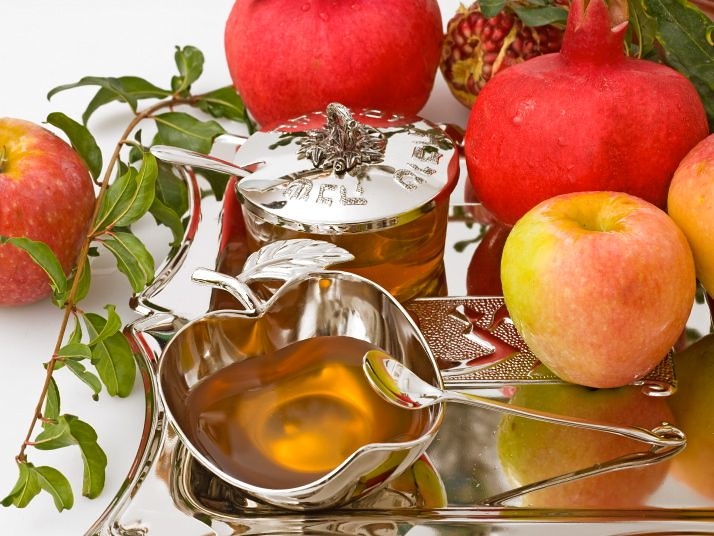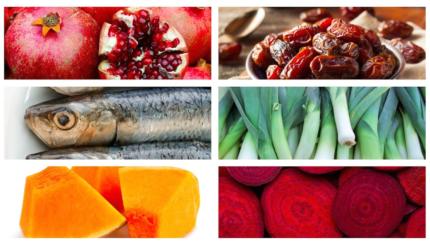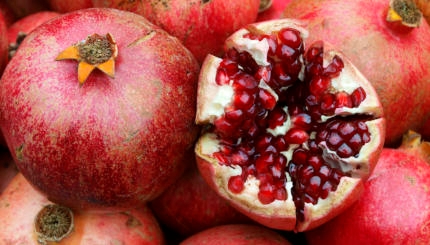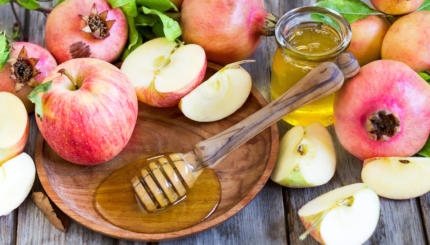Unlike Passover, whose central ritual — the Passover seder — takes place at home, Rosh Hashanah’s most important customs take place in the synagogue. The central home ritual of Rosh Hashanah is a special festive meal, much like the Friday evening meal at the beginning of Shabbat, except with a few additions and holiday-specific foods.
Note: Blessings and translations below are reprinted from the Machzor Rosh Hashanah Ashkenaz Linear as it appears on Sefaria.
Candle Lighting and Shehechiyanu
The holiday celebration begins with the lighting of candles (hadlakat nerot), symbolizing the transition to sacred time, and the recitation of the blessing thanking God for enabling us to reach this season (Shehechiyanu).
Candle Lighting
בָּרוּךְ אַתָּה יְהֹוָה
Blessed are You, Adonai
אֱלֹהֵֽינוּ מֶֽלֶךְ הָעוֹלָם
our God, King of the Universe,
אֲשֶׁר קִדְּשָֽׁנוּ בְּמִצְוֹתָיו
Who sanctified us with His commandments
וְצִוָּֽנוּ
and commanded us
לְהַדְלִיק נֵר שֶׁל יוֹם טוֹב:
to kindle the Yom Tov light.
Baruch ata Adonai, Eloheinu Melech ha-olam, asher kidshanu b’mitzvotav vitzivanu l’hadlik ner shel yom tov.
Shehechiyanu
בָּרוּךְ אַתָּה יְהֹוָה
Blessed are You, Adonai
אֱלֹהֵֽינוּ מֶֽלֶךְ הָעוֹלָם
our God, King of the Universe,
שֶׁהֶחֱיָֽנוּ וְקִיְּמָֽנוּ
Who has kept us alive and sustained us
וְהִגִּיעָֽנוּ לַזְמַן הַזֶּה:
and brought us to this season.
Barukh ata adonai elohenu melekh ha’olam, shehecheyanu, v’kiyimanu, v’higiyanu la’z’man ha’zeh
Kiddush (Blessing Over Wine)
Next, one sanctifies the holiday by reciting the special Kiddush (blessing over wine) for Rosh Hashanah. It is a custom to ensure that all family members and guests are able to participate by holding and drinking from their own cup of wine or grape juice. As with all other festivals, it is traditional to recite the Shehechiyanu prayer again after the Kiddush and before drinking.
Find the full text of the Rosh Hashanah Kiddush (with Shehechiyanu) on Sefaria.
Hamotzi
Before partaking of the meal, one recites Hamotzi, the blessing over bread. This is also a feature of Friday night Shabbat meals, in which this blessing is made over braided challah, the traditional twisted egg loaves. The text of the Hamotzi on Rosh Hashanah is exactly the same as the text on Shabbat:
בָּרוּך אַתָּה יְהֹוָה אֱלֹהֵינוּ מֶלֶך הָעוֹלָם הַמּוֹצִיא לֶחֶם מִן הָאָרֶץ
Blessed are You, Lord our God, King of the universe, who has brought forth bread from the earth.
Baruch ata Adonai, Eloheinu Melech ha-olam, hamotzi lechem min ha’aretz.
It is customary on Rosh Hashanah to make the blessing over round loaves, symbolizing the circle of life and the revolving seasons. And because we hope that the coming year will be a sweet one, the bread is customarily sweetened with raisins and drizzled honey.

Blessing Over the Apples
The hope for a sweet year is also the main reason behind one of the most well-known and popular customs of Rosh Hashanah: eating apples dipped in honey. The blessing over tree fruit is customarily recited:
 Barukh ata Adonai Eloheinu melekh ha’olam borei p’ri ha’eitz.
Barukh ata Adonai Eloheinu melekh ha’olam borei p’ri ha’eitz.
Blessed are You, Lord our God, Ruler of the universe, who creates the fruit of the tree.
יְהִי רָצוֹן מִלְּפָנֶךָ יהוה אֱלֹהֵינוּ וֵאלֹהֵי אֲבוֹתֵינוּ שֶׁתְחַדֵּש עָלֵינוּ שַׁנָּה טוֹבָה וּמְתוּקָה
Y’hi ratzon mil’fanecha Adonai Eloheinu shetichadesh aleinu shanah tova u’metukah.
May it be Your will, Adonai our God, that the new year will be good and sweet.
Birkat Hamazon (Grace After Meals)
After the meal, one recites the Birkat Hamazon, the “grace after meals,” including all the special additions marking the festival of Rosh Hashanah.
Find the full text of the Birkat Hamazon (with additional lines for Rosh Hashanah) on Sefaria.
Eating a New Fruit
Since Rosh Hashanah is a two-day festival, all of the above rituals are repeated the second evening as well with the addition of the custom of the new fruit. This custom developed as a technical solution to a legal difficulty surrounding the recitation of the Shechehiyanu blessing on the second day of the holiday. The blessing (text above), usually recited to commemorate a new situation, is said on the second day of Rosh Hashanah both in honor of the day and the new fruit.
A common choice for a new fruit is the pomegranate. This is a popular Rosh Hashanah fruit both because it is mentioned as being one of the native fruits of the land of Israel (Deuteronomy 8:8), and because of the traditional claim that there are 613 seeds in each fruit, which corresponds to the number of commandments in the Torah.
Eiruv Tavshilin
When Rosh Hashanah falls on Thursday and Friday (as it did in 2017), it is traditional to say an extra blessing called Eiruv Tavshilin before lighting the candles on the first night. The custom is to take bread or matzah and an item of cooked food such as meat or fish, put them on a plate and say the blessing, which can be found here. After the blessing, that item of food is put away and saved to be eaten on Shabbat.
Want to learn more about the High Holidays? Sign up for a special High Holiday prep email series.
challah
Pronounced: KHAH-luh, Origin: Hebrew, ceremonial bread eaten on Shabbat and Jewish holidays.
hamotzi
Pronounced: ha-MOE-tzee, Origin: Hebrew, blessing said over bread. On Shabbat Hamotzi is usually said over challah.
Rosh Hashanah
Pronounced: roshe hah-SHAH-nah, also roshe ha-shah-NAH, Origin: Hebrew, the Jewish new year.
Shabbat
Pronounced: shuh-BAHT or shah-BAHT, Origin: Hebrew, the Sabbath, from sundown Friday to sundown Saturday.
Shehechiyanu
Pronounced: sheh-hekh-ee-YAH-new, Origin: Hebrew, a blessing said upon experiencing a new or special occasion.
Kiddush
Pronounced: KID-ush, Origin: Hebrew, literally holiness, the blessing said over wine or grape juice to sanctify Shabbat and holiday.
Birkat Hamazon
Pronounced: beer-KAHT hah-mah-ZONE, Origin: Hebrew, Grace After Meals, the blessing thanking God for the food.



